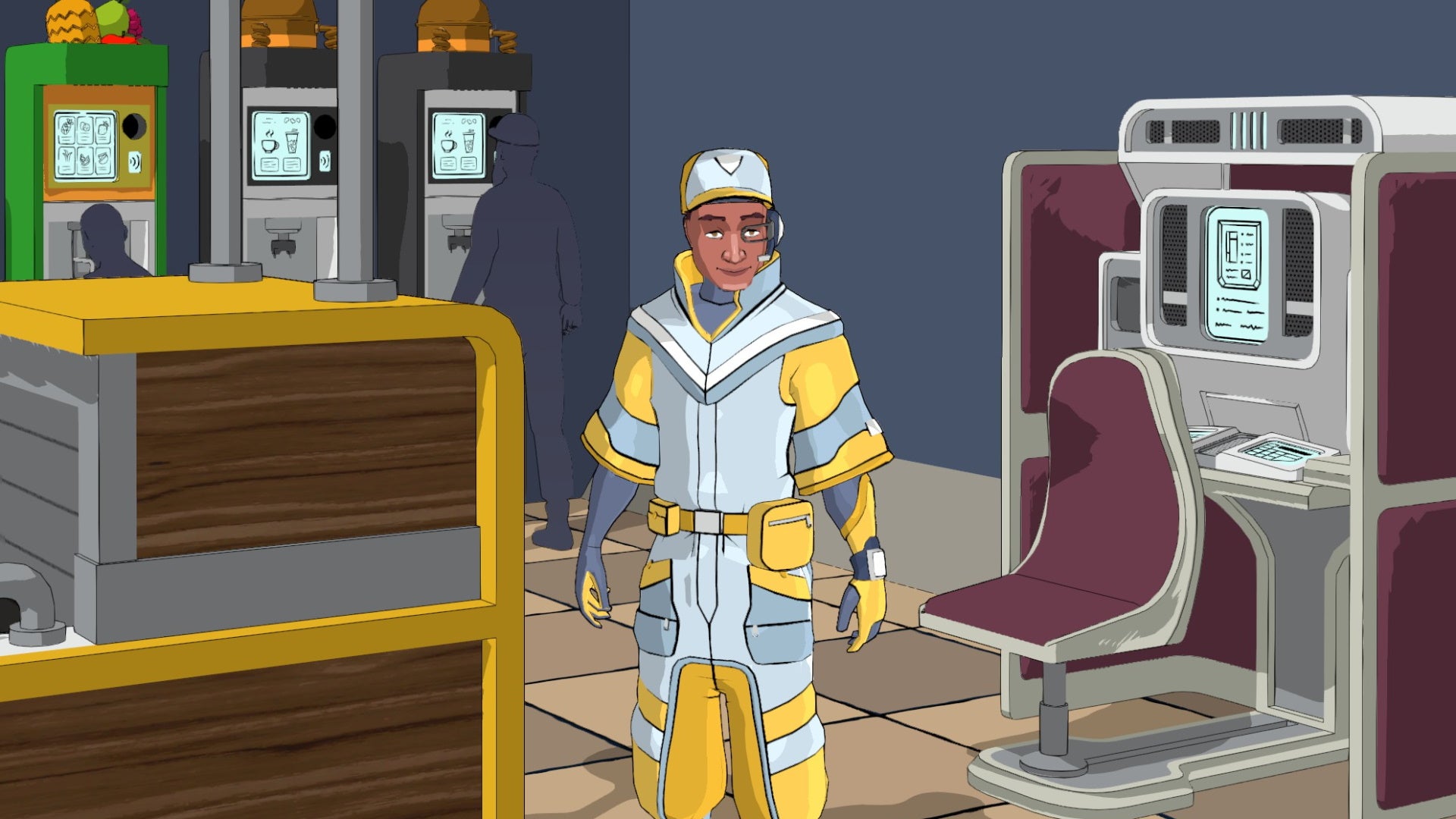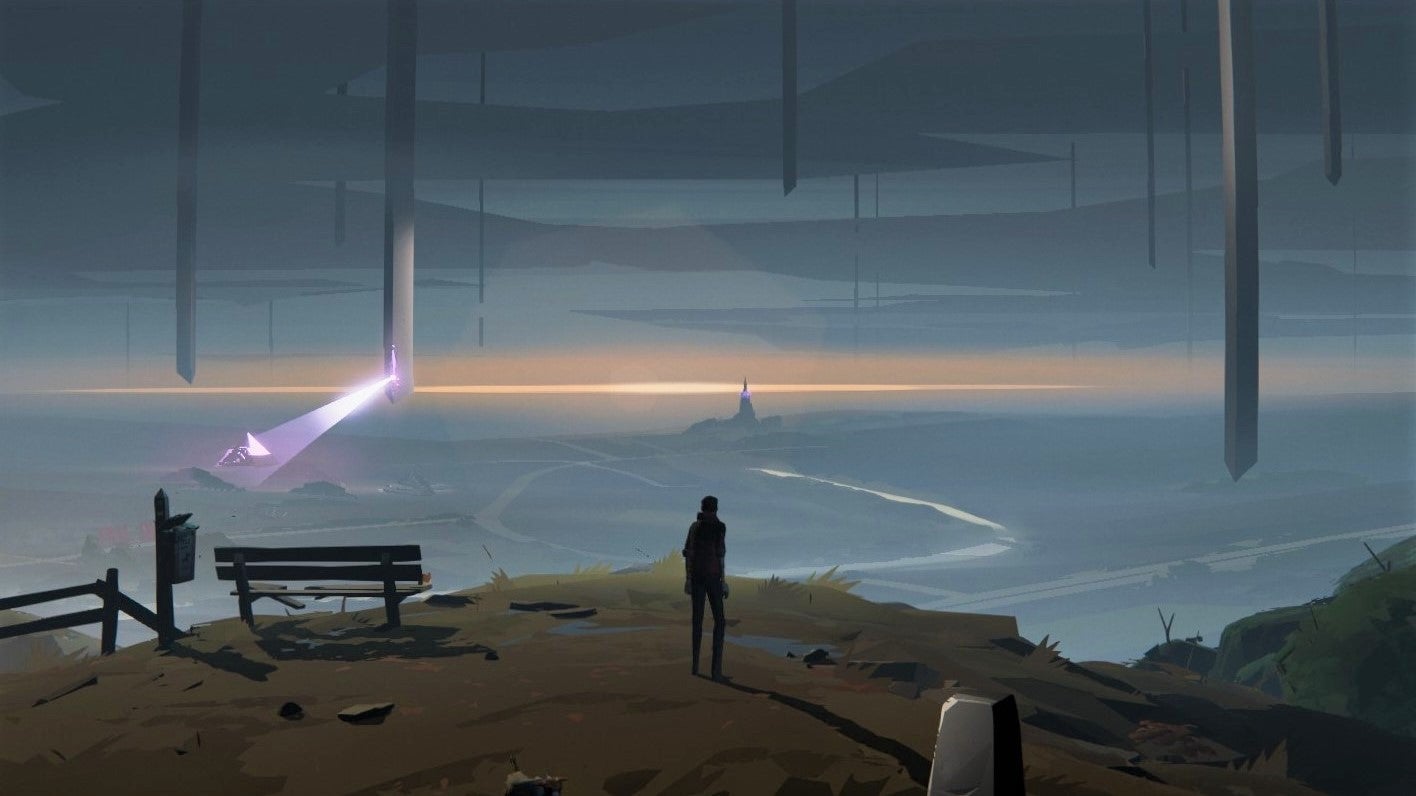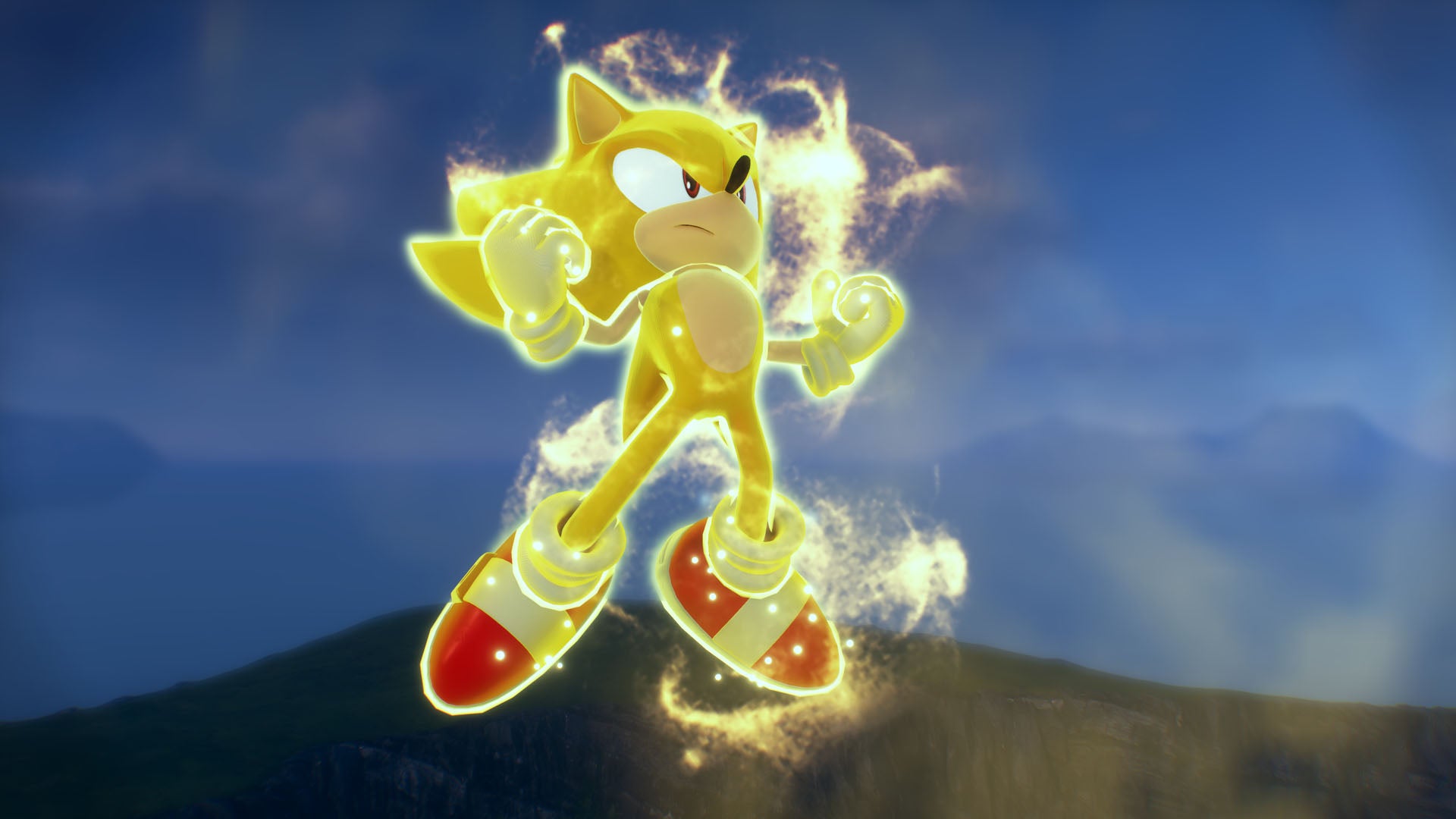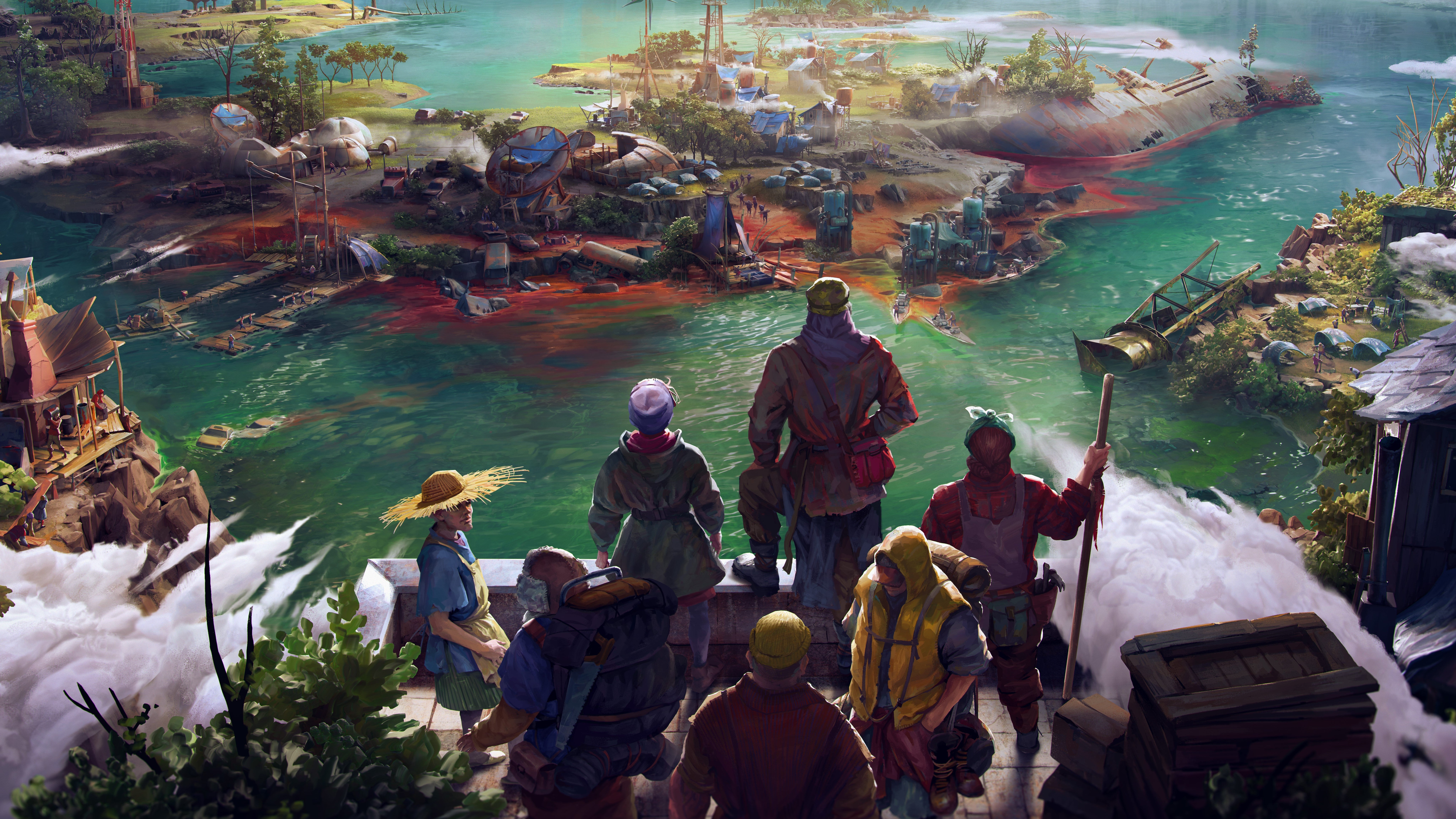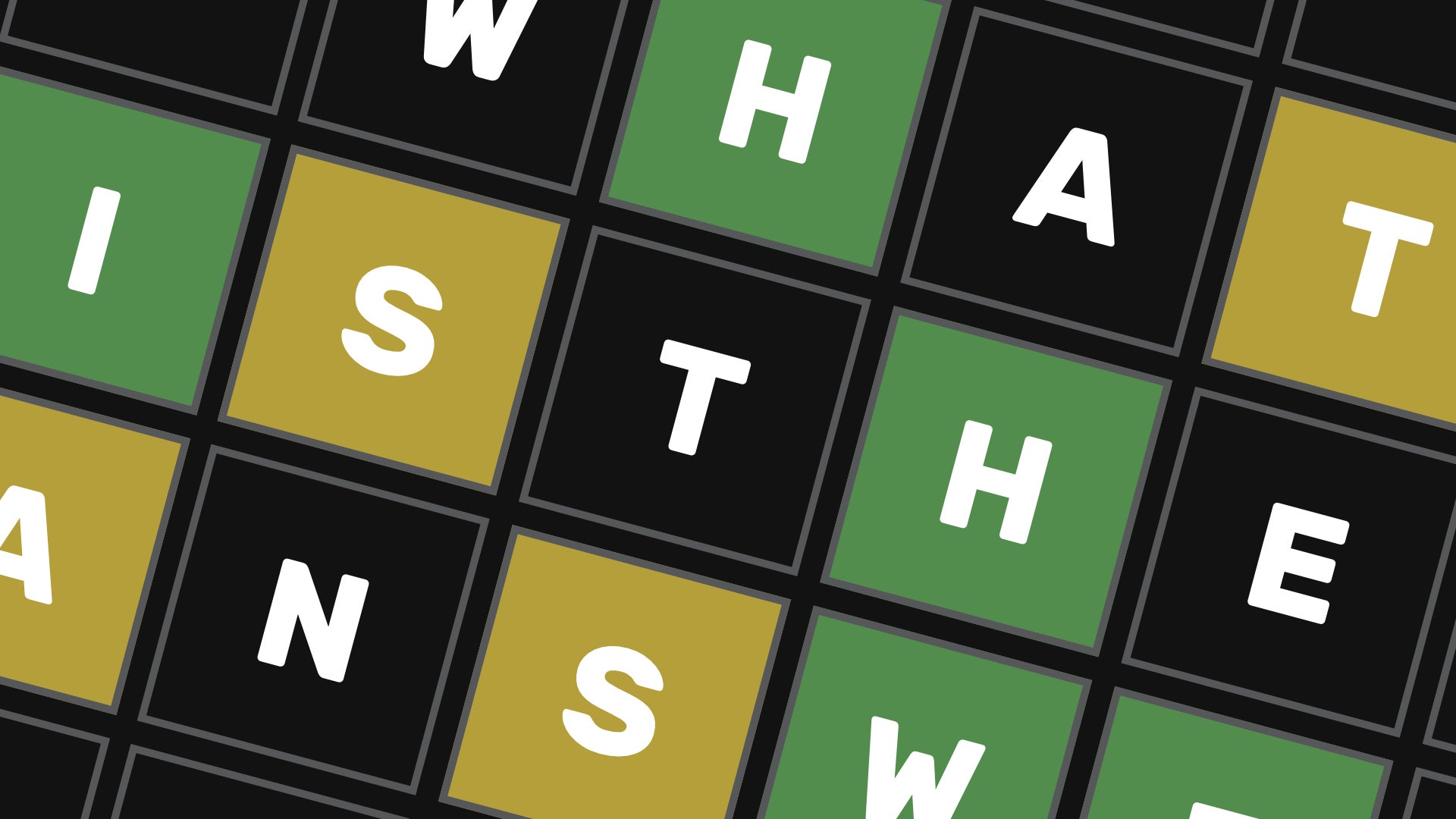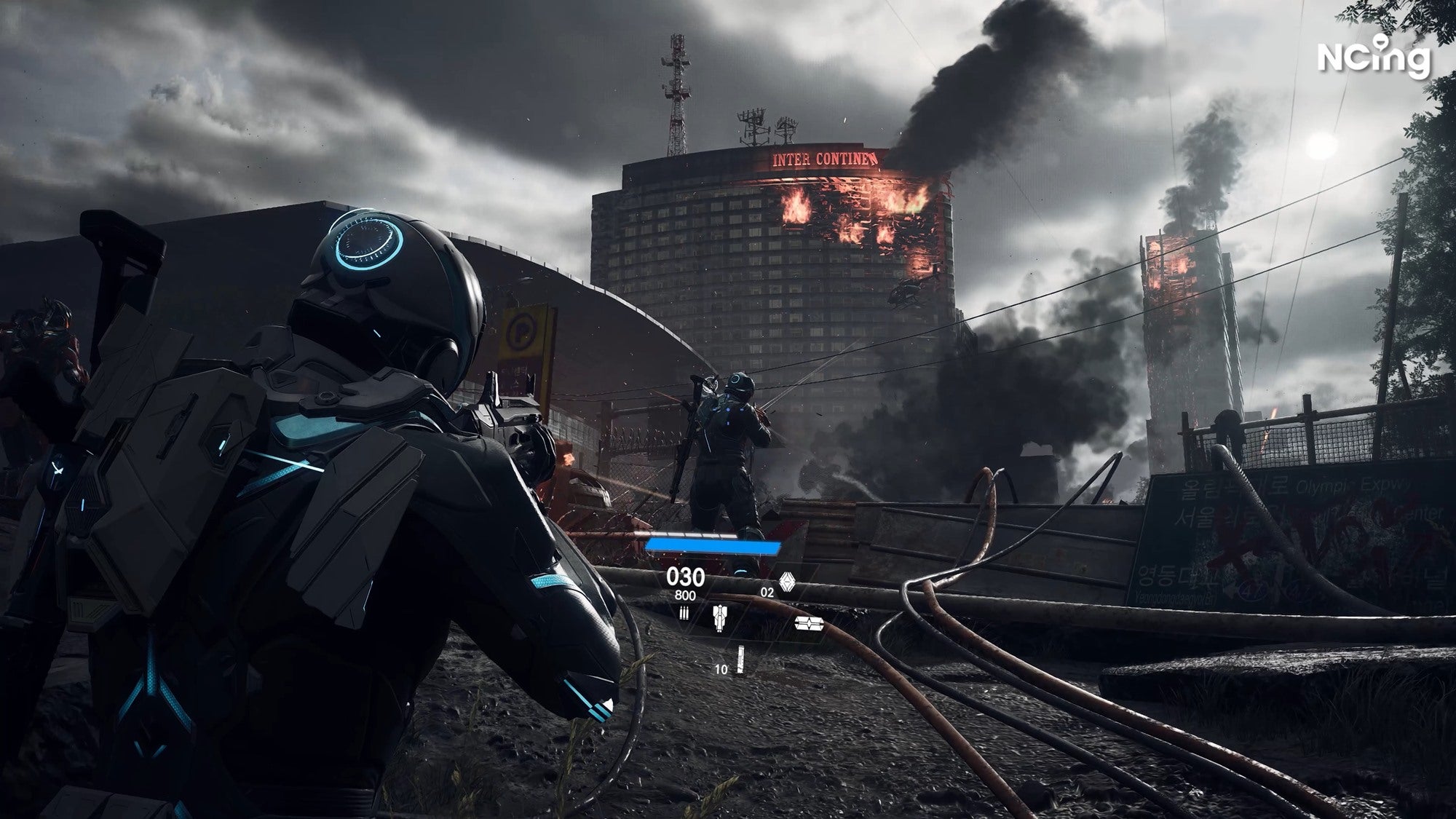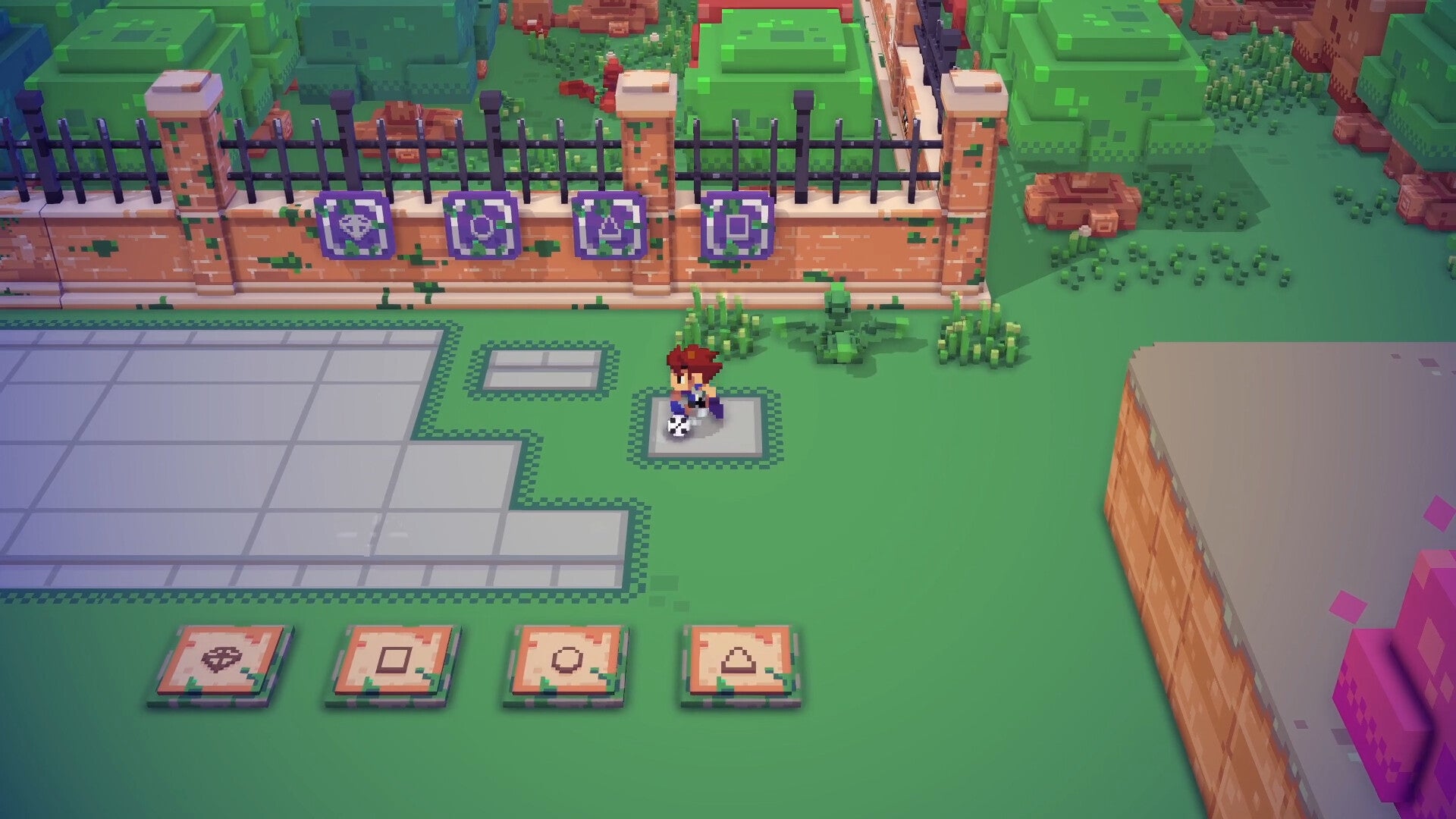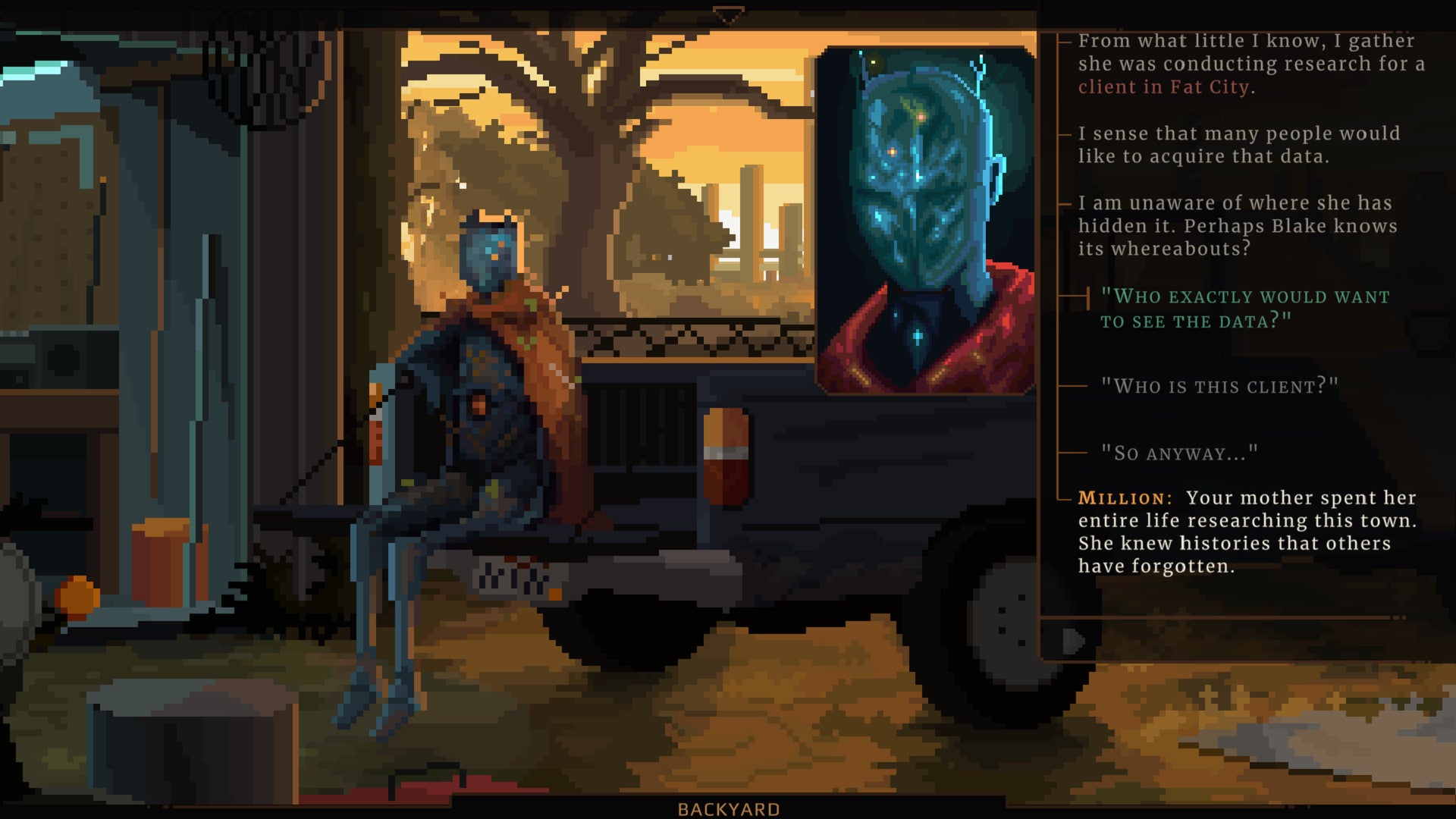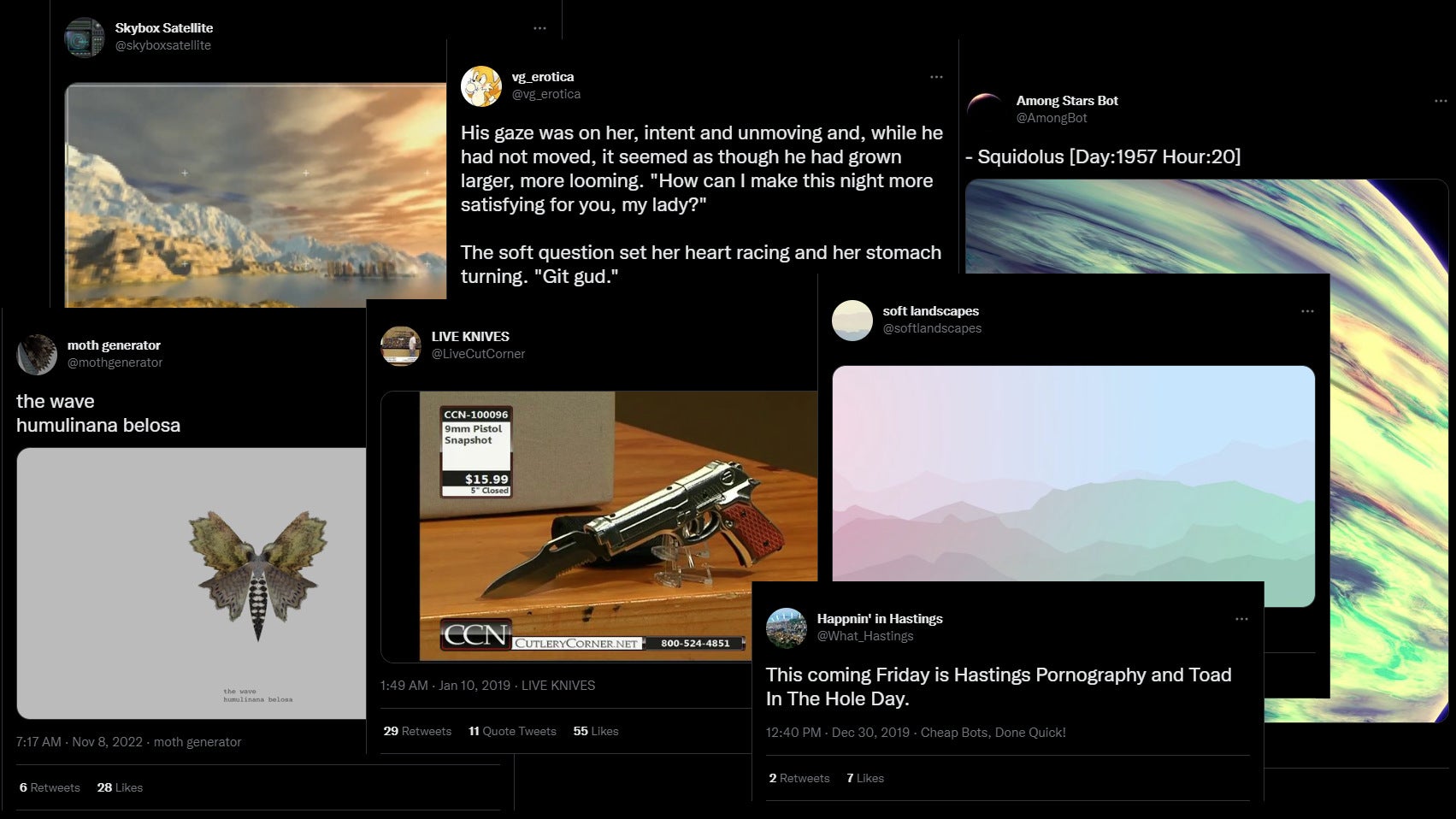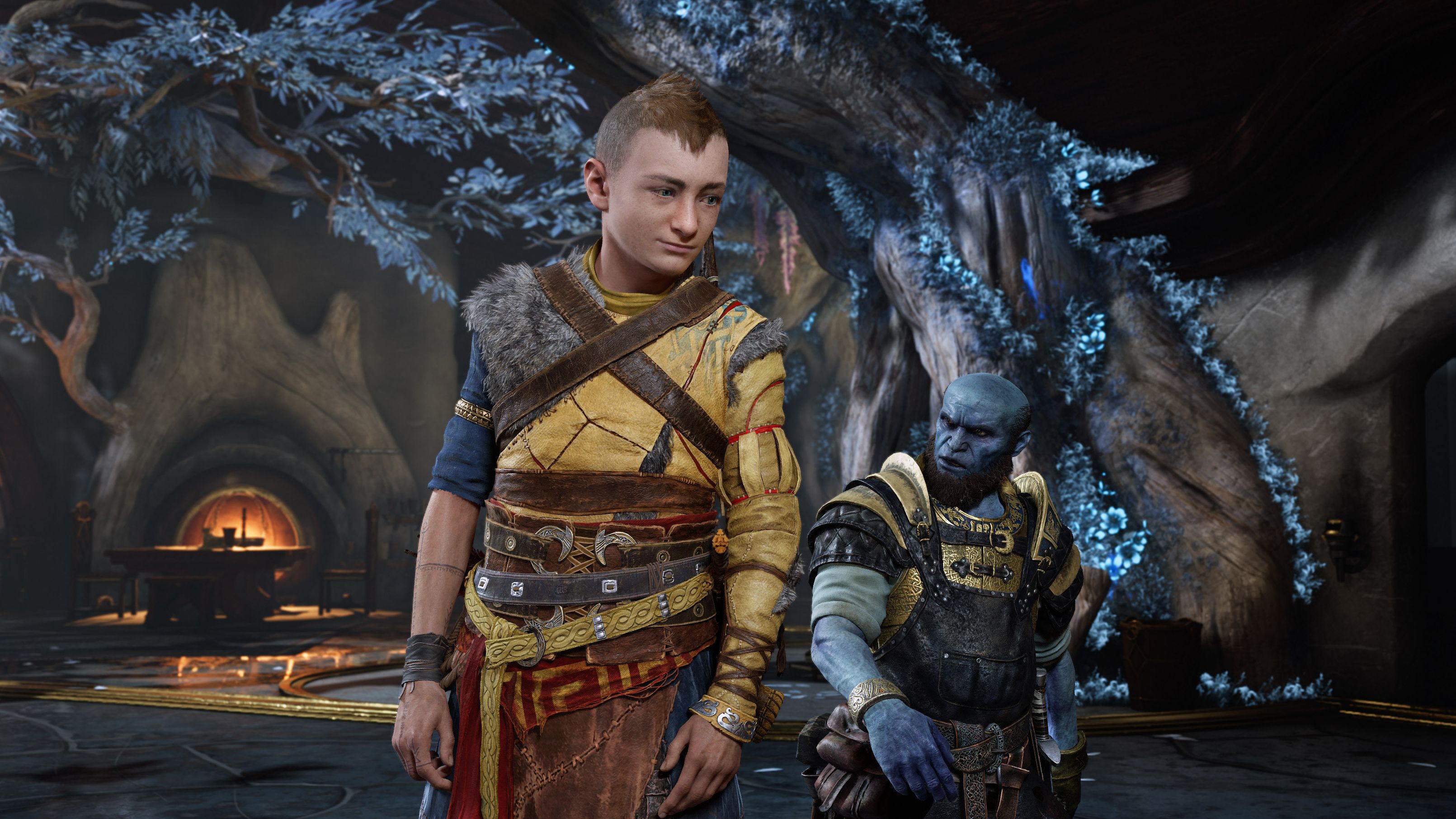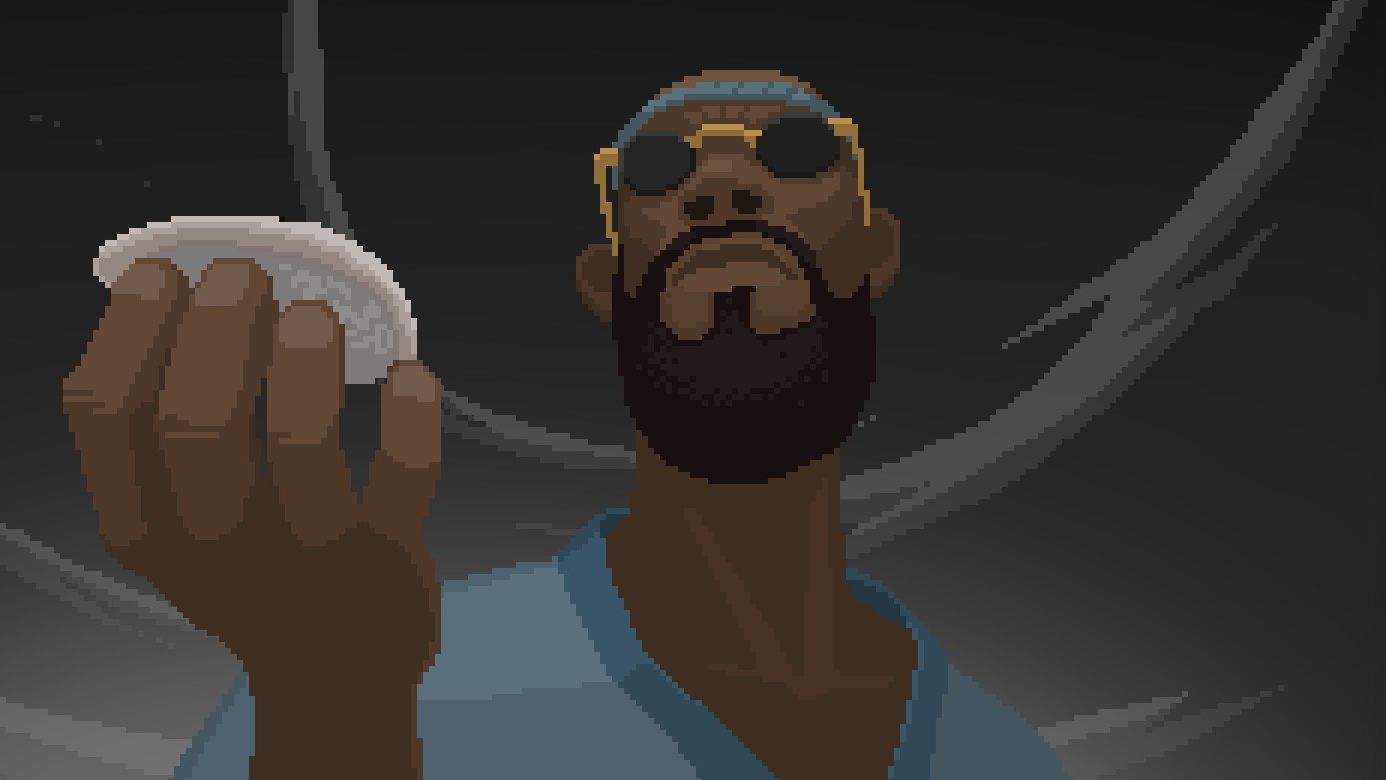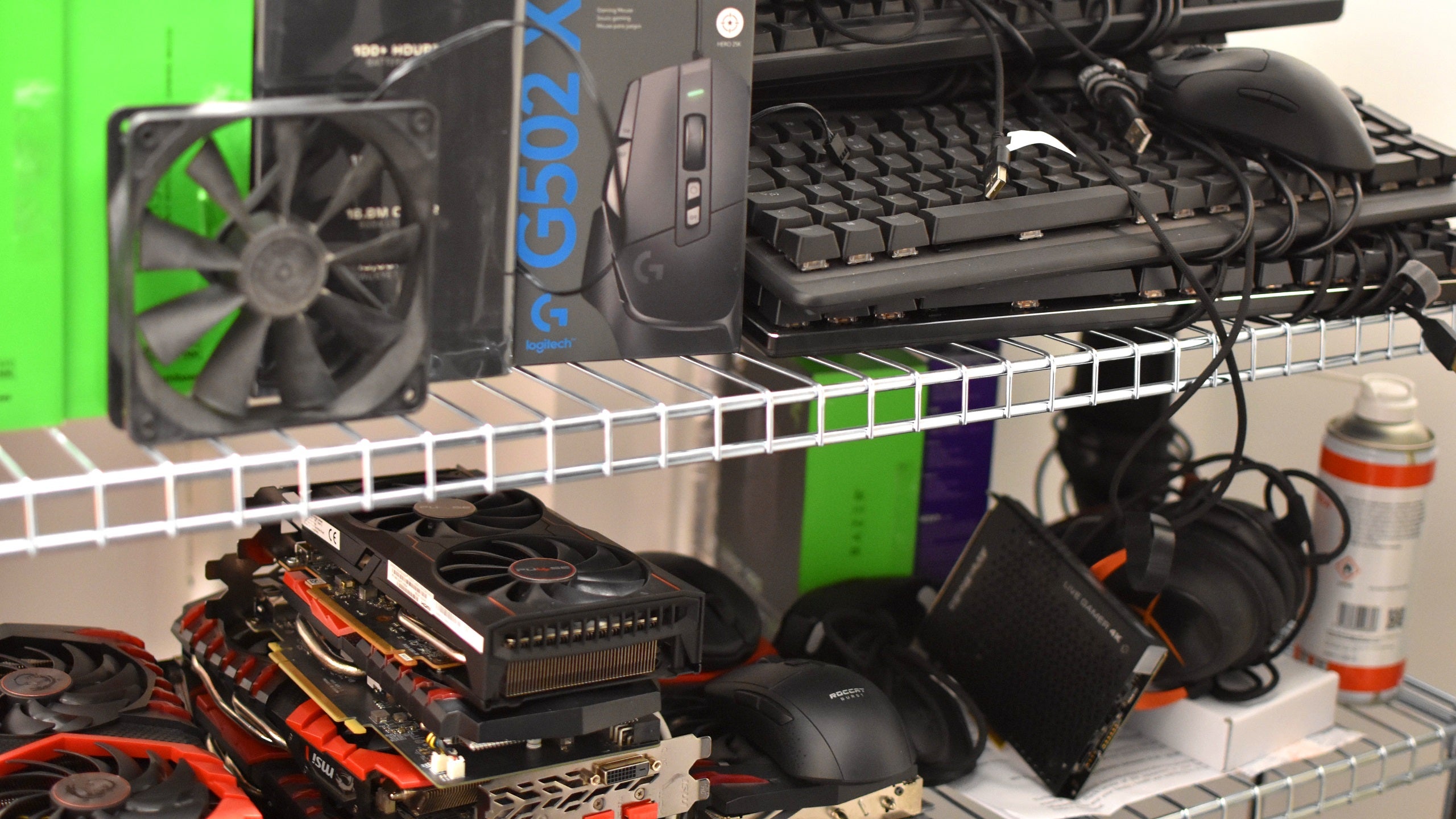Flat Eye review: a petrol station management sim powered by the same dark fuel as Black Mirror
Seer-iousy goodThe future has arrived in Monkey Moon's new narrative management game, and you can see it all the next time you go and fill up your car. At EyeLife's Flat Eye stations, why stop at getting milk and snacks when you can also pick up a whole new stomach, liver and other assorted organs? You'll find them on aisle five, right next to the surgery booths. Perhaps you'd prefer a quick medical checkup instead, though? After all, your tailored biometric predictions for the day looked a bit dodgy earlier, and goodness knows you're not going to wait to see an actual doctor about it.
Afterwards, why not escape for a bit and treat yourself to an immersive VR experience? They've got everything from hour-long fantasies to ones that last days, or even weeks. Your choice. And if you're short on time, you could always just give yourself those happy memories by sitting in their mind-altering MemoryMachines for a couple of minutes. Just don't forget to steer clear of the big recycle chambers. I heard something terrible happened to a dog who wandered into one recently, and the owner went absolutely ballistic. And watch out for the GentleSleep pods, too. I've only ever seen the clerk take long black sacks out of there and stick them in the incinerator, and the smell was awful.
But you are not a visitor in these futuristic service stations. You play as the manager of the Flat Eye Iceland branch, giving out orders to your drone-like clerk on the ground from the comfort of your corporate office chair - a fact hammered home by the desktop computer you boot up at the start of each day, and can return to at will any time during your 12-hour work shift while a picture-in-picture window of your branch plays out in real-time in the corner of your screen.
For the most part, though, you'll be keeping that camera window at fullscreen, watching and guiding your clerk through their daily service and maintenance tasks from afar. Whatever futuristic camera technology Flat Eye have installed here is wonderfully flexible, giving you the option of a classic top-down management perspective that can just as easily swoop right in for a close-up view of the shop floor, panning and cutting through walls and windows like butter so you can see every last detail of its bright, cartoonish visuals.
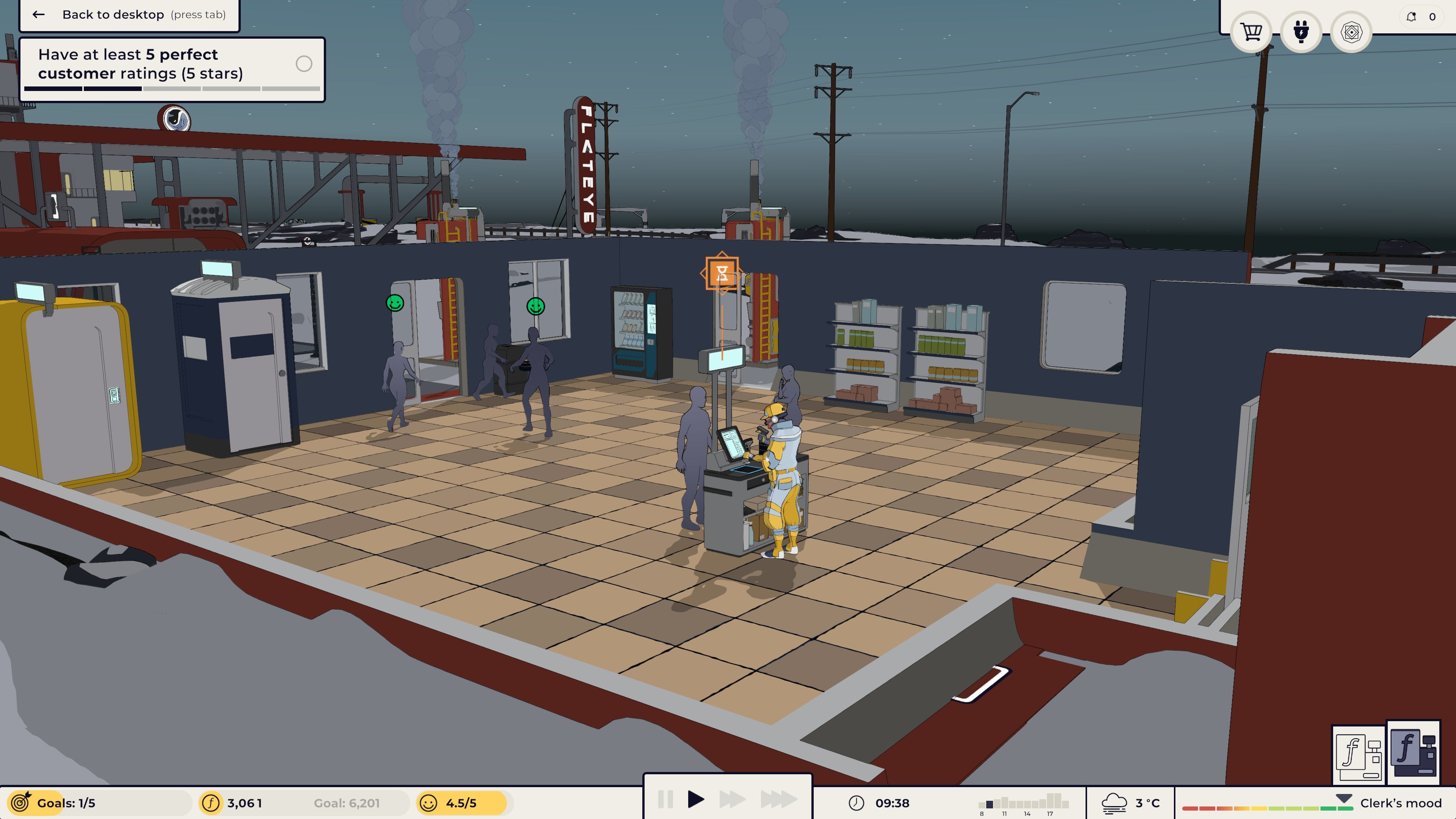
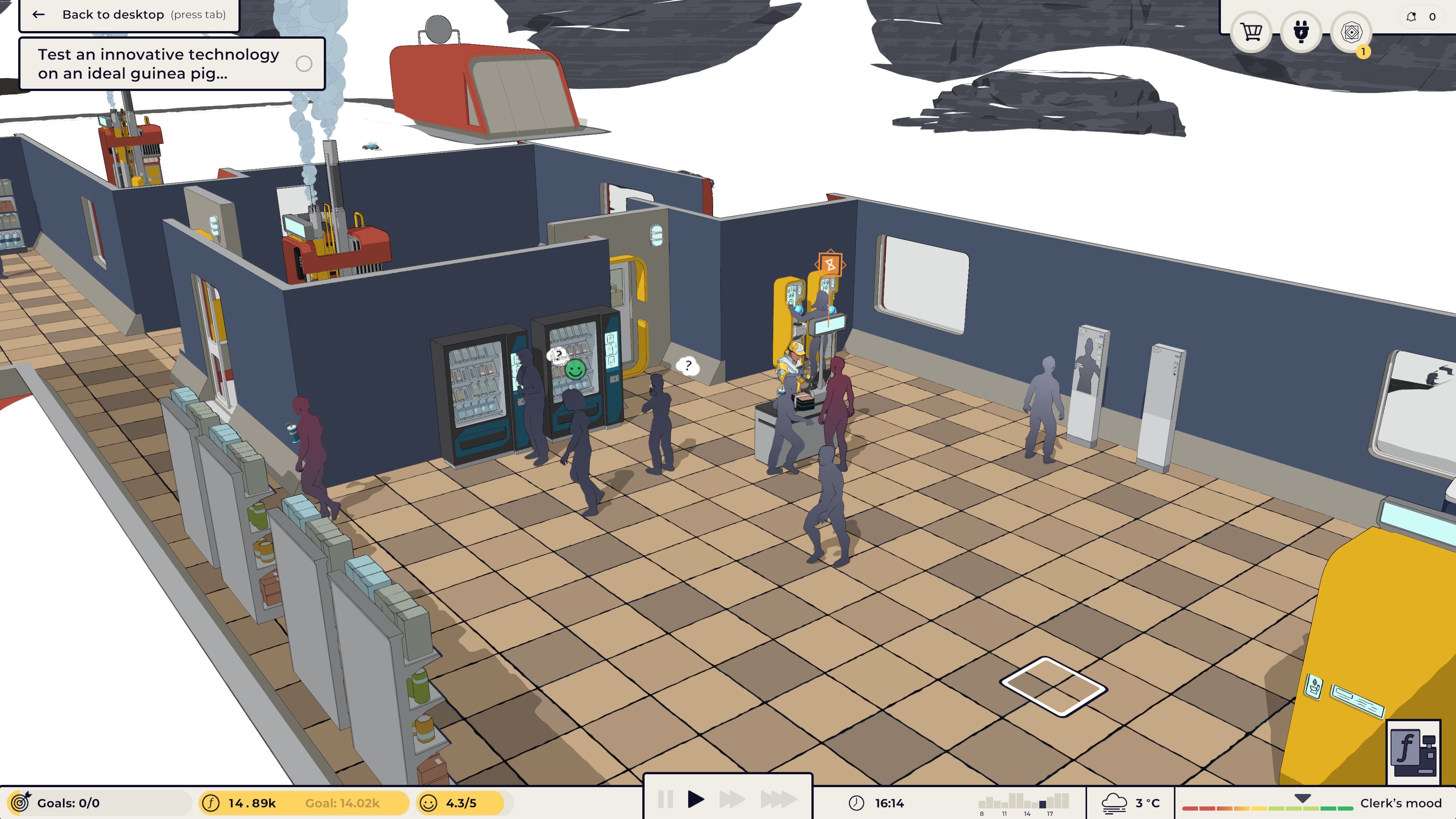
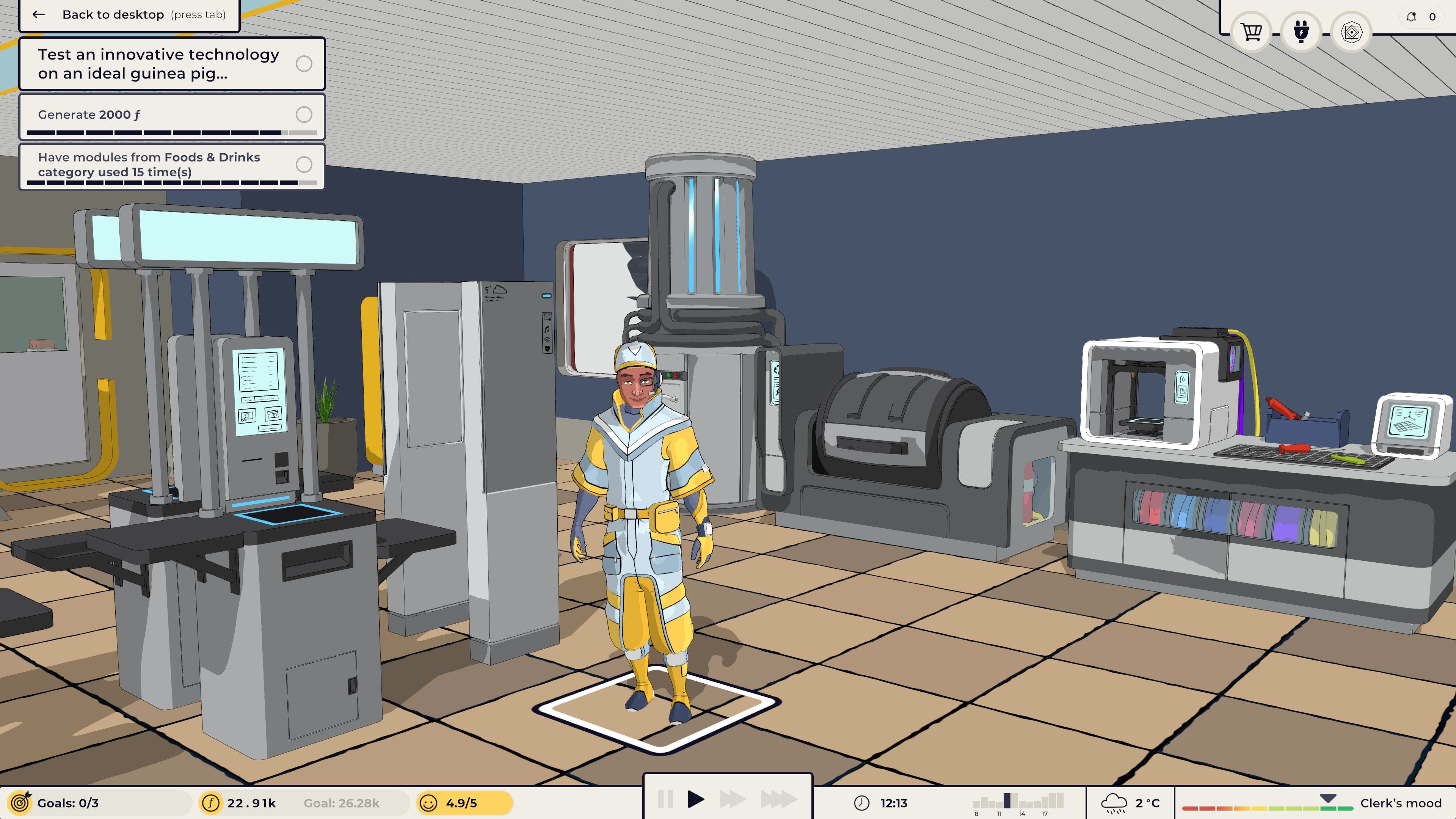
Two Point Petrol Station this is not, however. While you'll need to make sure each module is connected to a power source - a blissfully easy task thanks to its plug-and-play power grid menu - the bulk of your time will be spent repairing your modules and, until you unlock the self-service checkouts, manning the till. You can decorate your station with plants, bins, lights and other assorted corporate tat if you want to (and occasionally you'll be required to, if you draw one the corresponding mandatory task from your Flat Eye tarot deck that morning), but there's no customer wellbeing bars to manage, nor do you have to worry about spills or potential vom disasters over by the VR booths.
It's a management-lite, in other words, with probably one of the best-behaved customer bases the genre's ever seen. They'll eventually pulse red with rage if they're made to wait too long, at which one they'll just leave in a huff, but that's of little consequence to your bosses. Instead, your clerk's performance rating is really only based on whether you've met your profit goals at the end of every day - which, even with several walk-outs, is usually quite easy to achieve. Yep, late-stage capitalism is alive and well in the world of Flat Eye, but it's a subject that Monkey Moon interrogate extensively over the course of the game, along with all its troubling technological implications.
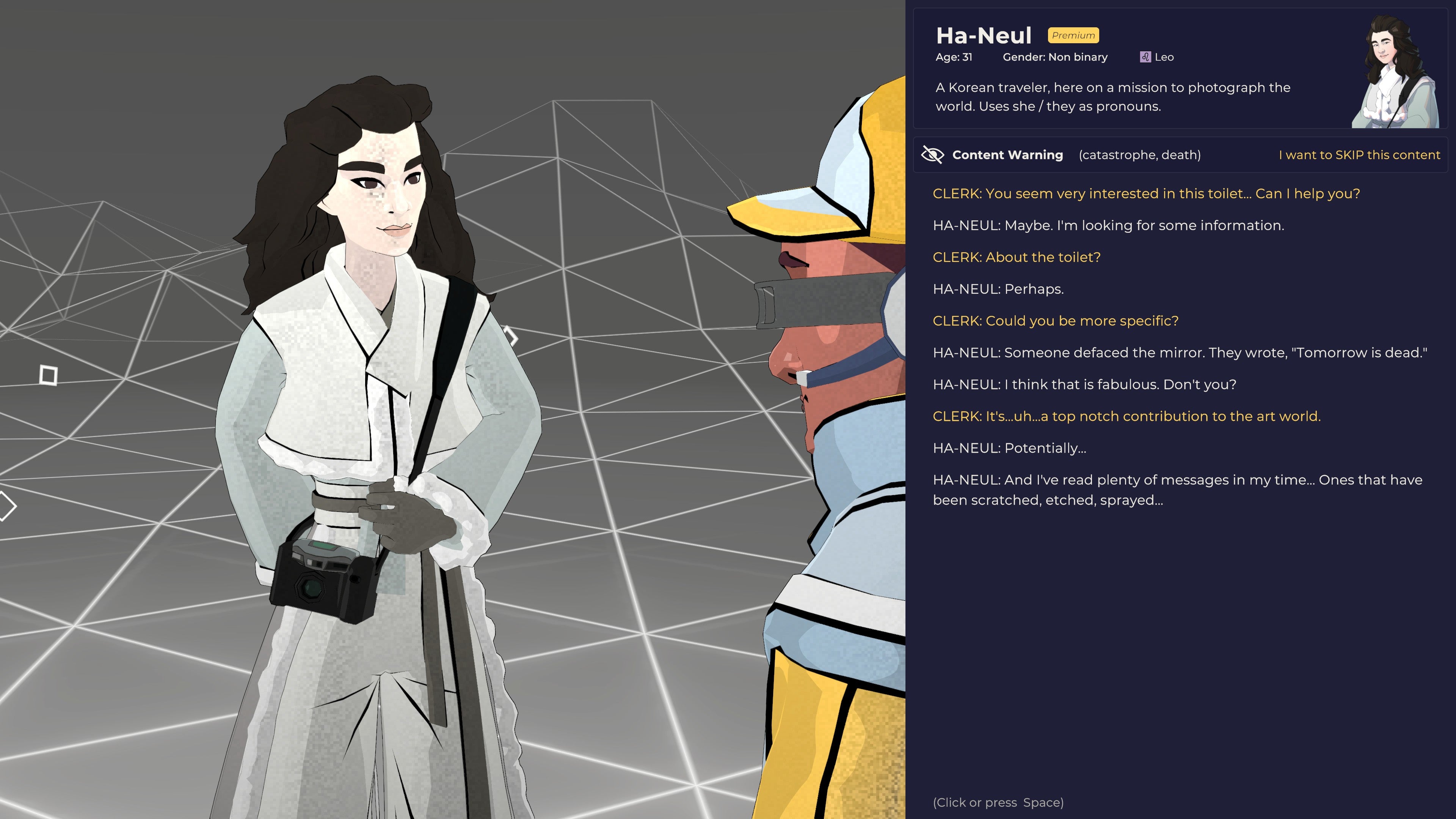
That's because, like Night Call before it, Flat Eye is a narrative game first and foremost, with Monkey Moon making effective use of the management genre's conventions to deliver their speculative, tech-fuelled visions of the future. These stories are centred around specific Premium customers who will stop in at your station every couple of days. Unlike the anonymised swarms that make up most of your daily customer base, these are named individuals with fully-formed profiles, and whose presence you're immediately alerted to as soon as they set foot in the door. It's an eclectic cast, from anti-tech hackers and conspiracy theorists to fearful farmers, and a criminologist who insists on fabricating a memory of murder so she can feel more empathetic towards her subjects, to name just a handful.
Each of them will be drawn toward a specific technology module once it's installed in your station, and every conversation you have will tease out another morsel of their story. It's a rhythm that will feel instantly familiar for returning Night Call players, as will its lively and naturalistic dialogue. They're good fun, these chats, despite their sensitive subject matter, and Monkey Moon handle each topic with great care and consideration - especially when you take into account the game's extensive and customisable content warnings, which will flag even the merest mention of a topic before you encounter it.
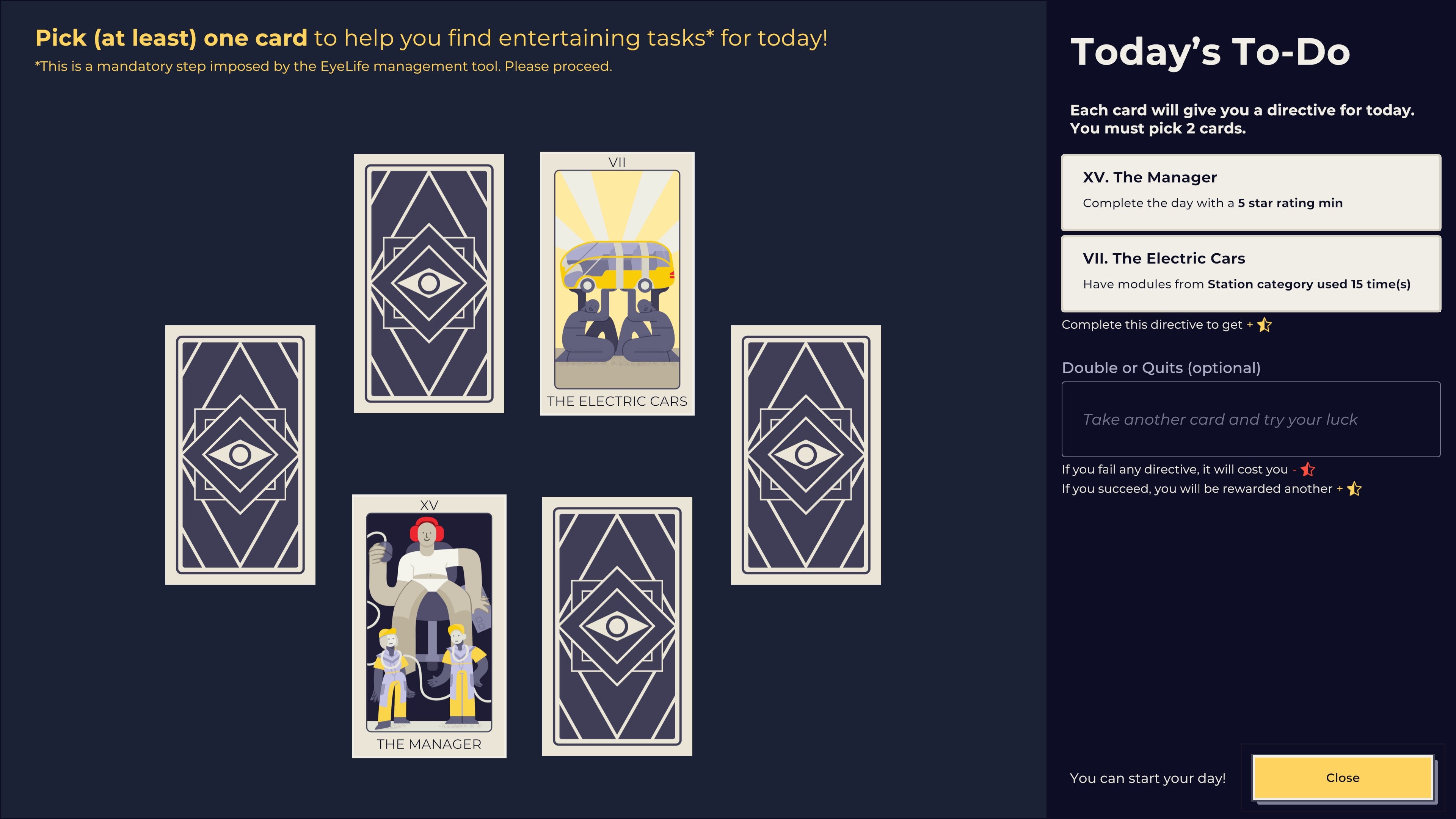
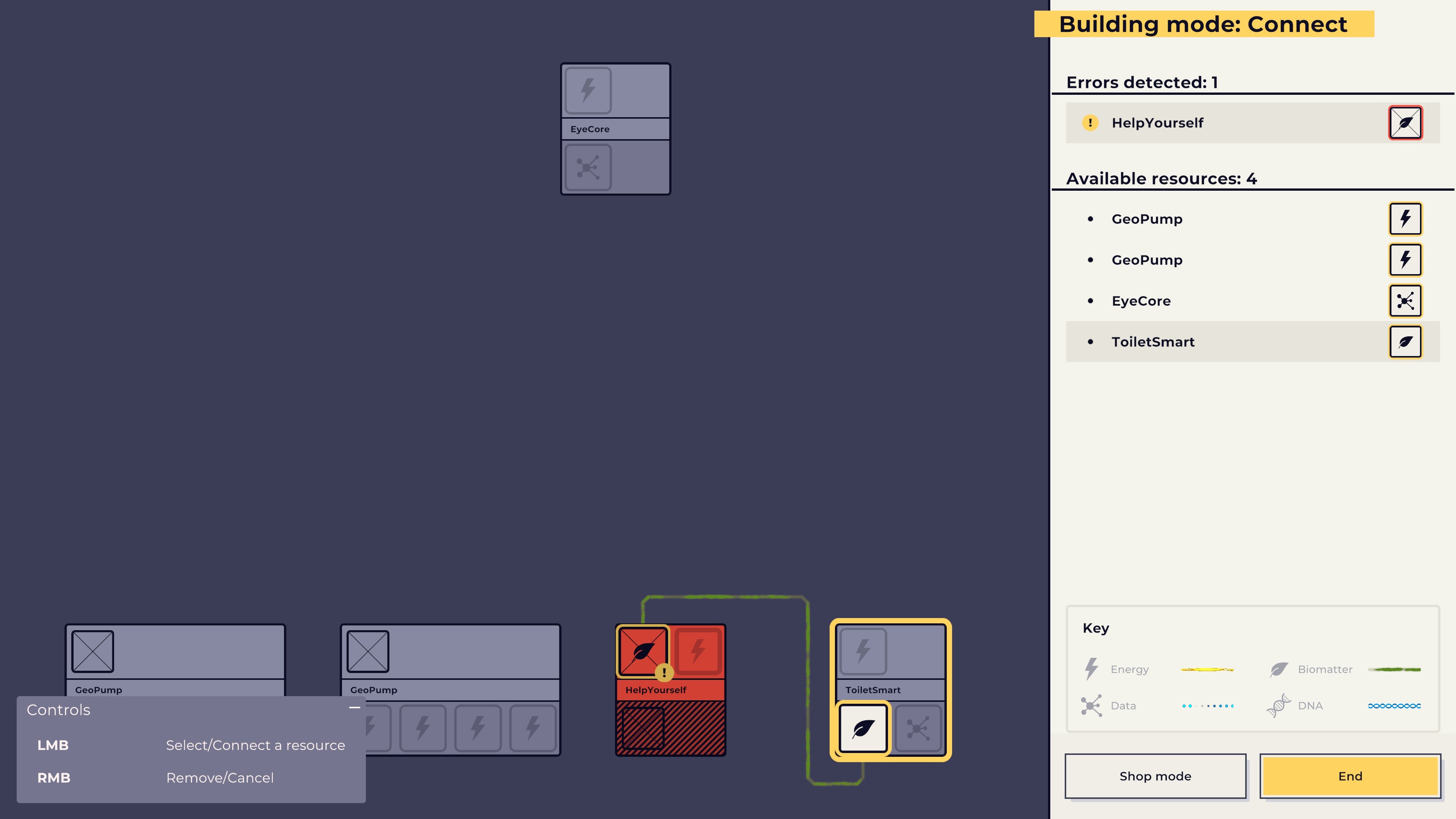
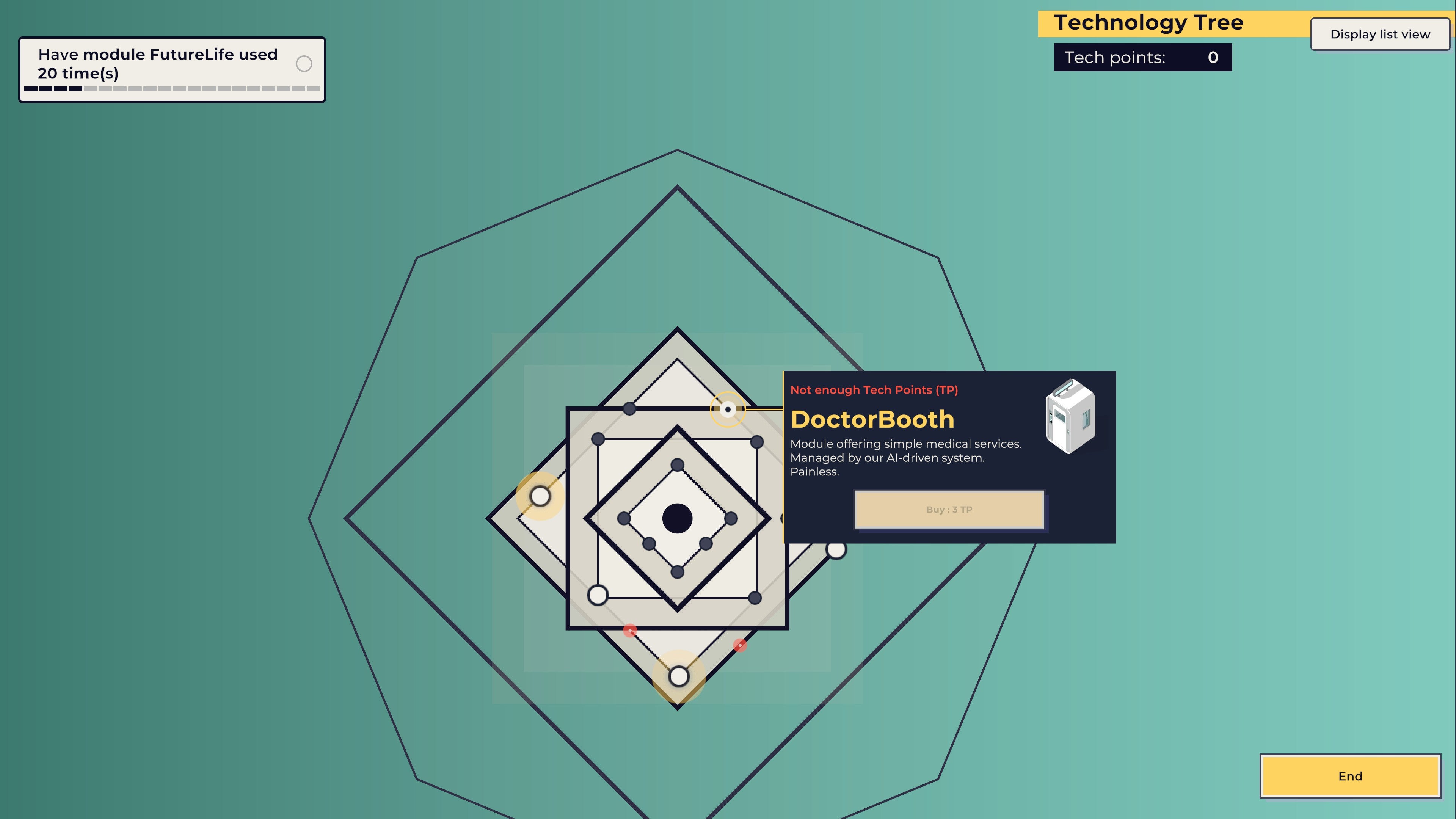
The main reason you'll occasionally be breaking out in a smile, however, is down to Flat Eye's all-seeing AI, a seemingly benevolent force in this corporate dystopia whose mission is to help humanity find a viable path through all the chaos and strife happening outside your station. She's a warm and witty (and wonderfully French) presence in this bleak landscape, and she'll regularly interject with her own thoughts and feelings on the matter at hand. She'll also talk directly to you, the manager, on how best to steer the conversation forward. However, while there are a couple of choices you can make here and there, the nature of your relationship with these customers means each encounter is typically a lot more focused on their respective tech module, leaving less room to go down conversational rabbit holes as you could in Night Call. This is something I missed a great deal in Flat Eye, although I totally understand why - if I was debating whether to pull the plug on my cryogenically frozen dad, or losing my mind over the memory of a murder I didn't commit, I'm not sure I'd want to talk about the weather or engage in idle chit-chat either.
Conversations are typically a lot more focused on particular tech modules, leaving less room to go down conversational rabbit holes as you could in Night Call.
There are other pacing issues Flat Eye has to contend with as well. There's always a jolt of excitement when a Premium customer walks through the door, but some encounters are so short and perfunctory that they don't feel like nearly enough reward for the wait that preceded them. It's here where the game's lite management elements start to feel a bit like needless busy work - something to keep your mind idling away while you wait for the next conversation drop to occur. Your desktop's Flatbook log of all your Premium clients will give you guidance on which modules you'll need to install to instigate a repeat visit, but it can be days, if not weeks before they do so. Sure, you'll have other Premium customers to deal with in the meantime, but the random drip feed of appearances doesn't feel nearly as nourishing as Night Call's constant supply of interesting taxi chats.
It doesn't help that it holds back almost half of its 24-strong cast until you get to the fifth and final tech tree level, which feels a little stingy for the 12 or so hours it takes to get there. Again, I can understand why. You're not just debating the moral quandaries of different technologies with these people after all. Flat Eye's AI is also using these chats to test how these different forms of technology will likely be used in the future. In those 12 hours, for example, I'd only unlocked one of its dozen-odd visions of the future, and that was the outlawing of the eternal youth machine the devs had talked about previously during our interview a while back. Not all character stories end in one of these decisive forks in the road, you see, and with the latter half of the game focused on finding, and then choosing, one of four possible 'good' futures for the human race, it makes sense that so many end up waiting in the wings.
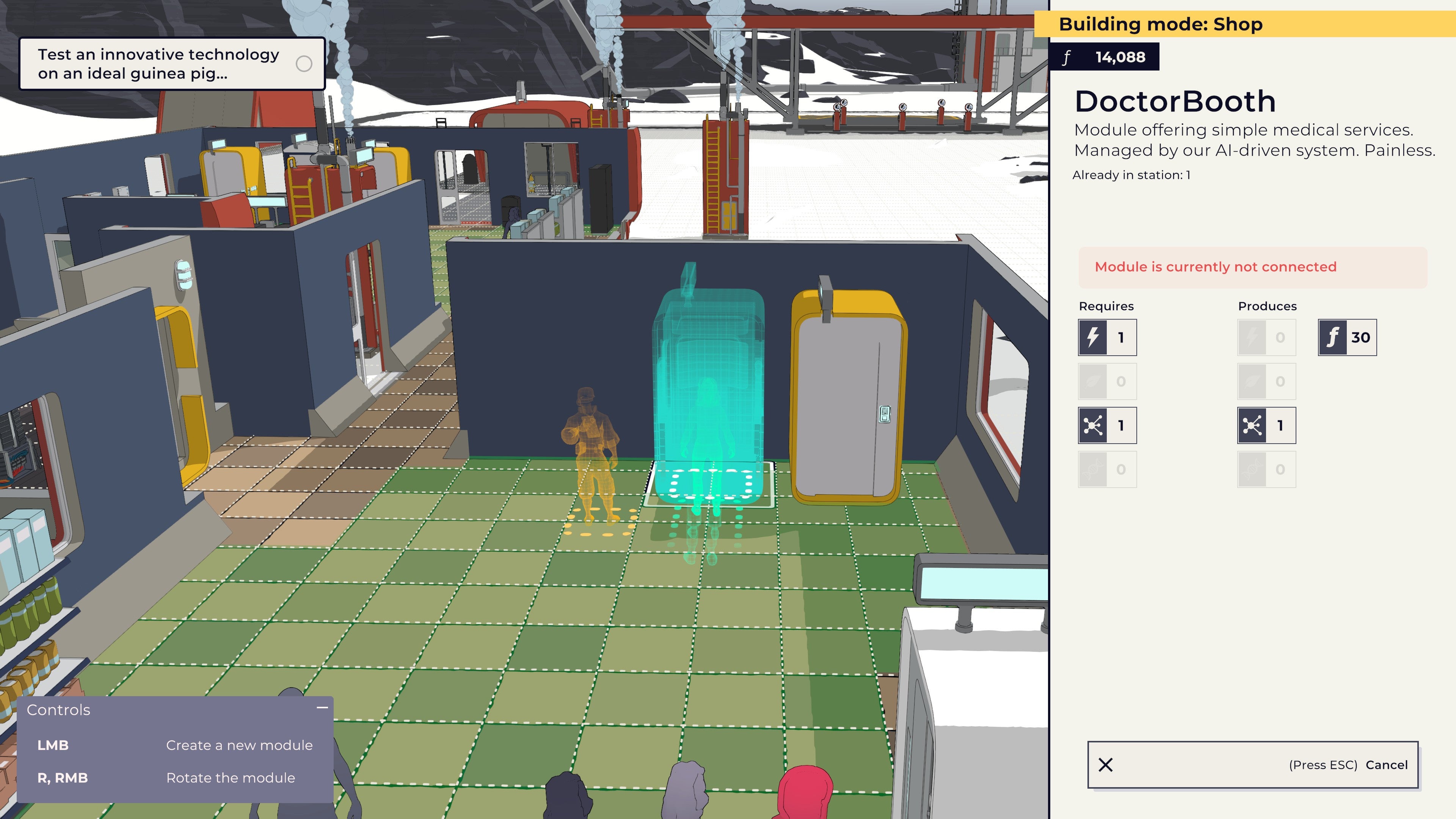
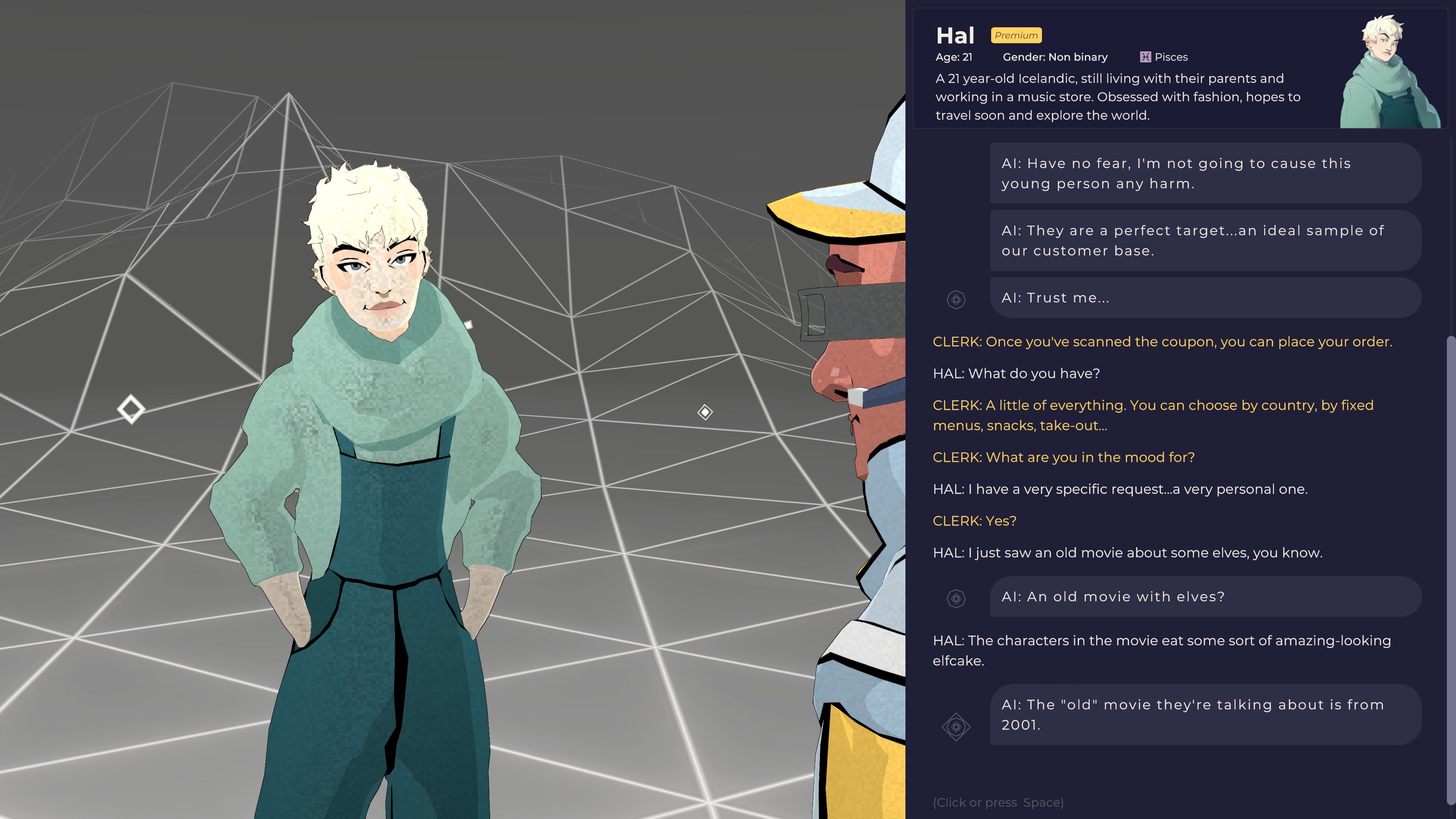
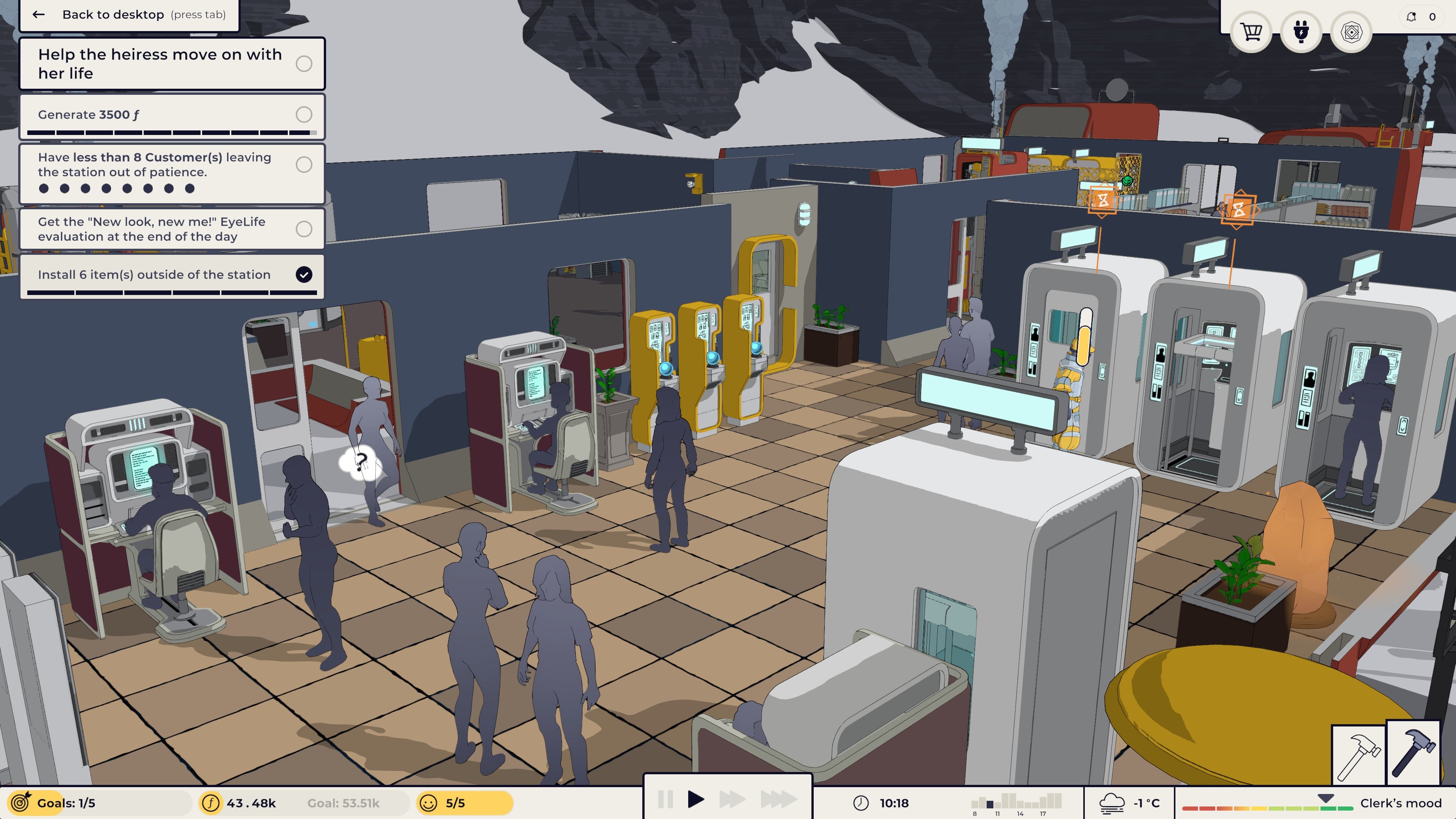
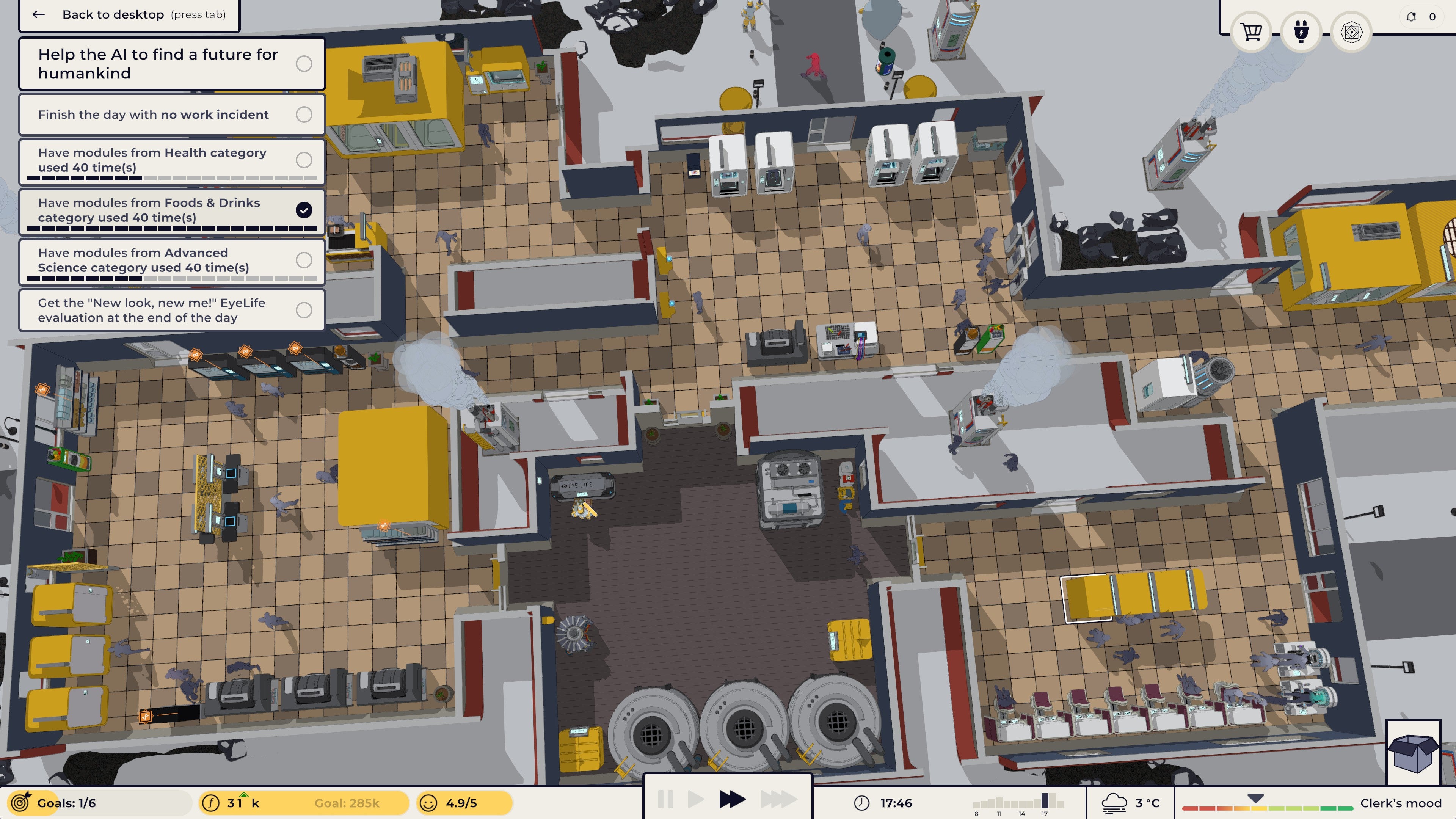
For me, Monkey Moon's bubbly and intelligent script did make the wait worthwhile in the end, but I suspect the endless maintenance loops will start to grate long before you get to them. As your manager level improves, so do the number of mandatory tasks you're allotted to complete each day, for example, and there were times where I'd been asked to install yet another six modules three days on the trot. Eventually, I just started ignoring them, my half-star deduction points be damned. Of course, I wouldn't be surprised if these tarot cards were yet another form of commentary on the pointless busywork inflicted on the working masses, but man, it sure doesn't make them any less tiring in the process. Top marks for the endless cycle of new Flat Eye CEOs coming in every three days, though (and the subsequent blocking of all incoming user messages on the Flat Eye intranet). That's a great bit of observational comedy that somehow feels even more pertinent now than it probably did just a couple of weeks ago.
Flat Eye may not represent the future of management games as a whole then (not least because it's incompatible with the Steam Deck at time of writing), but it's nevertheless a compelling and thoughtful exploration of what our real world future likely has in store for us. Monkey Moon spin a lot of disparate threads over the course of this narrative management experiment, but the resulting tapestry they weave at the end of it all is truly something worth celebrating. They continue to do important, singular work with their conversational debates, and while some of Flat Eye's themes will no doubt upset certain parts of the population, there's still plenty of light to be found among the dark if you enter its world with an open mind - not least the grimly comedic moments that ensue when you have a parade of afternoon clean-ups to perform from the old GentleSleep machine. Its corpo dystopia may be further along the tech ladder than we are, but I take heart in the fact that Flat Eye's still only set in 2022. If they can course correct away from several world-ending visions of what's to come, perhaps we can too.

